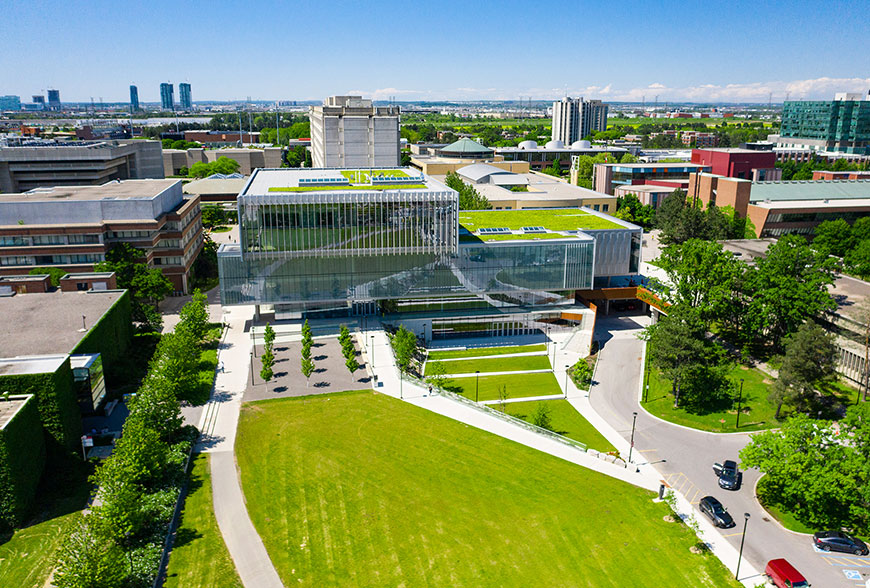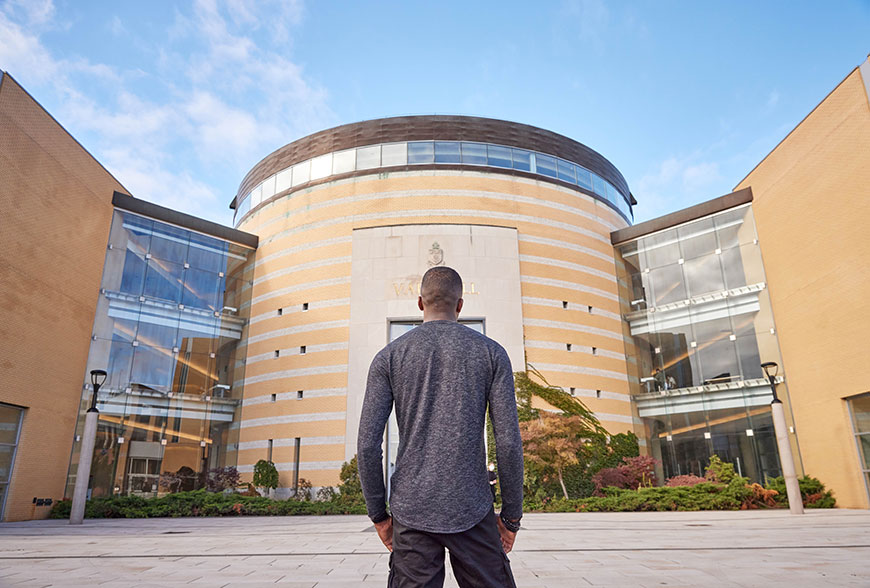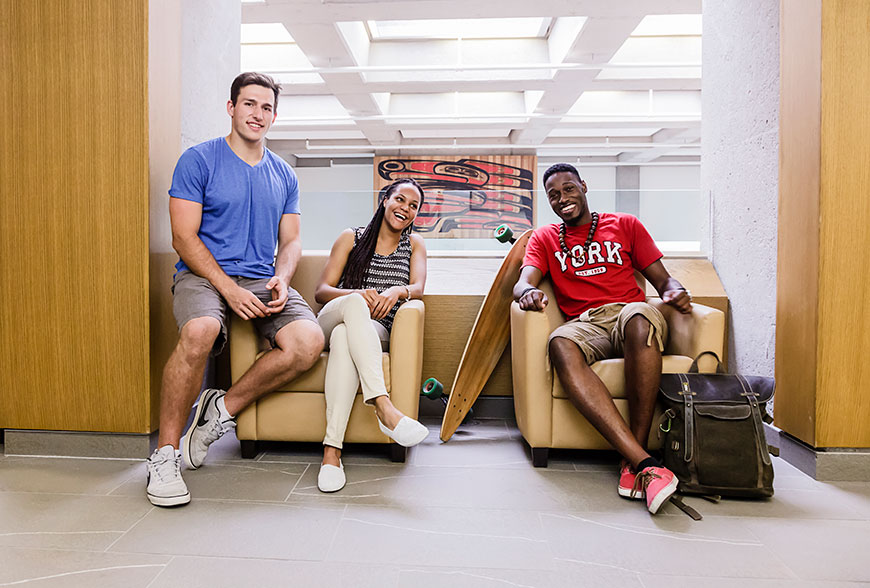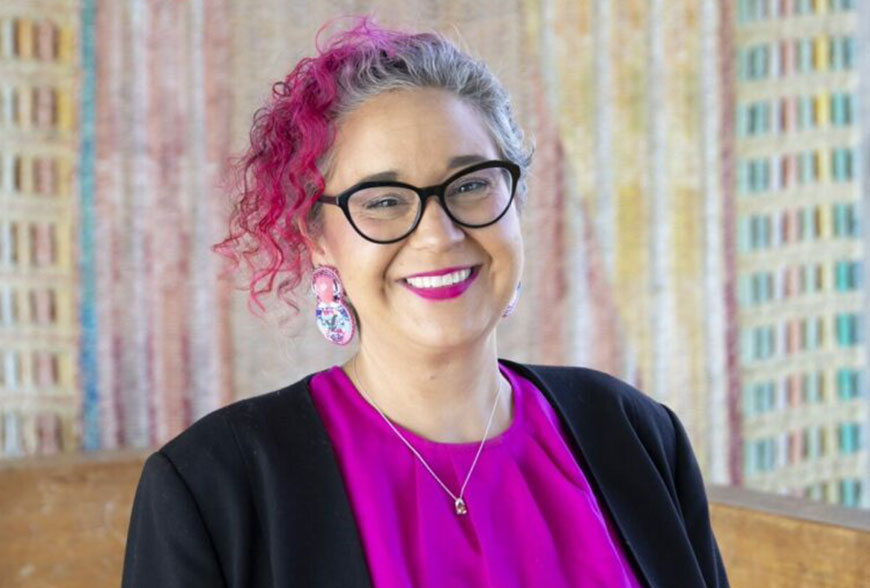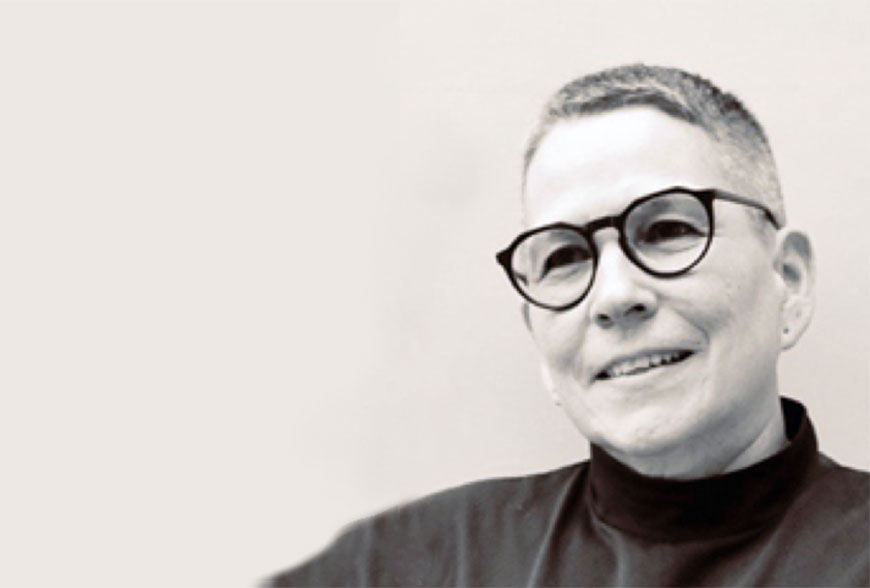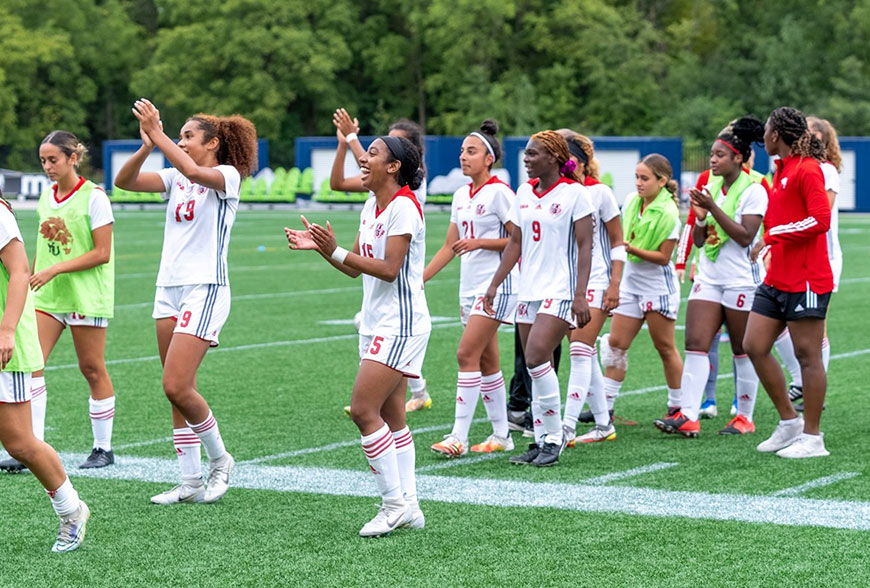Anishinaabe teachings refer to the gift of Mino Bimaaddiziwin or the Good Life, and core to this is our ability to feel included and connected as a community. With more than 360,000 alumni living and working around the world, and dozens of community partners and organizations who are also committed to positive change, it is essential that York continue to support programs, activities and initiatives that advance our ability to live the lives we desire for ourselves and others.
#33
in the world out of 1406 Universities, up from 67 last year in THE Impact Rankings.
#50
in THE World University Subject Ranking for Law.
3,765
participants attended 33 Respect, Equity, Diversity and Inclusion workshops.
$6M
allocated to update 245 classrooms to support technology-enhanced learning.
In November 2021, York University’s Board of Governors approved Living Well Together: Keele Campus Vision and Strategy, a foundational document that sets a clear path forward for re-imagining more than 190 acres on York’s Keele Campus.
The strategy is centred around the priorities of the UAP and the United Nations SDGs. It is a once-in-a-lifetime chance to envision, shape, and develop a truly community-engaged university campus at Keele: intentionally inclusive, environmentally sustainable, and welcoming to diverse communities.
Living Well Together proposes development that will include partnerships and leases that stay true to the University’s values and academic mission; the University will retain ownership of lands, partnering in the development of structures and amenities that benefit students, community members and neighbours, and will consider land disposition only to achieve significant strategic benefit.
It embraces social and environmental responsibility, emphasizes projects that help York realize its priorities, supports the University’s commitment to being carbon neutral by 2049 or sooner, and embeds principles of social and environmental responsibility into strategies to maximize the economic benefits of such a large-scale project.
The plan includes the reinvigoration of the Harry W. Arthurs Common, home to the York University subway station, and proposes four new neighbourhoods within the campus including a commercial centre; a high-tech district; a primarily residential district; and a second residential, commercial, and athletic neighbourhood around the Pioneer Village subway station.
SDG 11: Building Sustainable Cities and Communities
Led by the Division of Equity, People and Culture, York released the Addressing Anti-Black Racism: A Framework on Black Inclusion in February 2021 and the Action Plan on Black Inclusion: A Living Document for Action (2021) in December 2021. In March 2022, the inaugural Annual Report on Black Inclusion was released.
The Annual Report is an overview of more than 300 events, workshops and initiatives that took place at the University since the release of the framework and action plan, and underscores the University’s commitment to accountability and transparency in regard to our progress.
The report highlights the University-wide efforts that are underway to address the 81 action items outlined in the framework and action plan. It includes actions, programs and events that fall into nine major categories: Accountability, Community Engagement, Data Collection, Decision-making, Safety, Education, Knowledge Creation, Mental Health Supports, and Representation.
All actions, including hiring 12 new Black faculty members and a Lassonde School of Engineering 14-week paid research program for 25 Black and Indigenous students from the York Region District School Board (YRDSB), are consistent with York’s pledge to enhance equity, diversity and inclusion for Black, Indigenous and other underrepresented groups.
UNSDG 10: Reduced Inequalities
In January 2022, the student-operated theatre company Vanier College Productions (VCP) at the Faculty of Liberal Arts & Professional Studies launched the BIPOC Artist HUB.
Directed by VCP alumni Alex Jyn-Li Cairns, the interdisciplinary HUB is designed to empower students who identify as Black, Indigenous or People of Colour (BIPOC) through community-building activities, discussions, workshops, and guest speaker series as well as the provision of meaningful professional opportunities in theatre, dance, music, visual art, film, design, and media.
The HUB aligns with York’s broader commitment to creating a more equitable and inclusive society that celebrates the contributions of diverse communities.
UNSDG 10: Reduced Inequalities
The Student Systems Renewal Program (SSRP) is a user-focused, multi-year transformation program with the goal of improving the student, faculty, and staff experience by introducing new processes and technology solutions.
The program aims to develop streamlined, accessible, consistent, and high-quality services that make it easier for students to apply and manage their learning lifecycle; for faculty to plan and administer courses and curricula; and for staff to be able to access the information they need to better support a student’s learning journey.
The resulting savings from these transformations will be reinvested in initiatives that align with York’s UAP priorities, which include providing global learning and research opportunities for students, supporting innovative curriculum delivery, and developing connections to experiential learning opportunities.
To successfully deliver a change of this magnitude, SSRP is working collaboratively with the York community and involving key stakeholder feedback and expertise in various phases of each project. Recent milestones include:
- Successful implementation of Identity and Access Management (IAM) solutions that will work collaboratively to ensure the right people get the right access to the right systems at the right time.
- Entering the design phase for the Financial Aid, Awards and Scholarships solution of the Next Generation Student Information System (SIS) project, which is on track to be rolled out to the York community in the summer of 2023. This solution will help students and staff better manage financial aid, awards/scholarships and graduate funding.
- Entering initial planning stages for the Constituent Relationship Management (CRM) solution – an engagement tool that will be used to manage student recruitment, application, and admission and connect current students to the advising supports they need.
- Establishing a cloud infrastructure via the Enterprise Integration Platform to transport new solution data to existing York applications.
In 2020, York University developed a vision for Service Excellence that aims to create positive change for the York community by fostering a cultural shift toward greater service excellence across the University. In 2021, the Service Excellence Program (SEP) became the roadmap for achieving this vision.
Over the last two years, SEP has made significant progress in creating positive change for the York community through improved services, including fully digitizing expense claims, simplifying expense reimbursements and launching a new job repository for Confidential Professional & Managerial (CPM) employees to make hiring more efficient. The program has also been implementing a University Services Centre (USC) to make high-volume administrative services – such as client services, classroom operations and payroll and records – simpler, faster, and more consistent.
Currently, SEP is focused on organizational redesign work in Human Resources and Finance/Budgets & Asset Management and delivering improvements that result in more efficient processes and services to make York a better place to learn, teach, and work.
In 2021, York University professor and citizen of the Haudenosaunee Confederacy Ruth Green won the City of Toronto’s Mino Bimaadiziwin Award for advancing Truth & Reconciliation and making significant community contributions in the areas of human rights, transformative justice, gender equity, and disability.
As an academic, Green has mentored Indigenous students and led the development of innovative apps and programs for Indigenous youth across the country. As a leader and activist, she has served as co-chair of York’s Indigenous Council and as Special Advisor to the President on Indigenous Initiatives and volunteered with diverse organizations ranging from Aboriginal Legal Services to Social Planning Toronto.
UNSDG 10: Reduced Inequalities
In May 2022, York launched a new website to bring the University Academic Plan (UAP 2020-2025) priority of Living Well Together to life through a pan-university approach. The website increases accessibility to community well-being resources, establishes transparency in the Well-being Strategy development, and supports collaborative governance and community engagement.
To create the future well-being strategy, project sponsors, executive committee members, and advisory groups are working together to understand the diverse needs and priorities of the York community and establish well-being benchmarks. Community consultations will be launched in late fall and campus assessments are currently being completed in alignment with two national standards from the Mental Health Commission of Canada.
SDG3: Good Health and Well-Being
In July 2021, York University appointed Professor Susan D. Dion as the University’s inaugural Associate Vice-President of Indigenous Initiatives. Dion is an internationally renowned Lenape and Potawatomi scholar with mixed Irish and French ancestry, and a member of York’s Faculty of Education.
The creation of this position is one of the actions York has taken in its commitment to promote Indigenous scholarship, support decolonization and advance indigenization on-campus and beyond. As Associate Vice-President, Professor Dion is contributing to the implementation of York University’s Indigenous Framework and Decolonization of Research Administration Report recommendations. She is also supporting other Indigenous Initiatives across our campuses, through collaborations with the Centre for Indigenous Student Services, the Teaching Commons, the Faculty of Graduate Studies and others.
Dion works closely with York University’s Indigenous Council, of which she was a founding member. As a respected member of the York community, Professor Dion is a key partner in the University’s mission to amplify Indigenous voices and agency across Canada by promoting Indigenous research and education, supporting organizational transformation, and creating meaningful opportunities for dialogue.
UNSDG 10: Reduced Inequalities
A new mandatory two-part training series will support the University’s broader commitment to dismantling structural barriers faced by marginalized communities through innovative programs and inclusive and equitable dialogue.
The Resisting Oppression, Advancing Rights (R.O.A.R.) program, designed exclusively for varsity student-athletes, will help participants understand key terms, policies, and principles relating to race, ethnicity, sex, gender, religion, mental and physical disability, and socioeconomic background.
Participations will be encouraged to use this understanding to address unconscious biases, support their peers, and foster an environment marked by connectedness and belonging.
SDG 10: Reduced Inequalities
Through the Places of Online Learning for the Adjudication of Researchers Inclusively and Supportively (POLARIS), York aims to address the challenges that faculty and researchers from marginalized groups continue to face in their academic and research careers.
POLARIS, an online asynchronous education and learning tool, provides awards and search committee adjudicators with the resources and tools to successfully navigate the processes equitably and responsibly.
POLARIS launched in April 2022, the tool exemplifies York’s ongoing commitment to acknowledging and rectifying the marginalization of traditionally disadvantaged groups by increasing opportunities for talented faculty members and trainees to engage in research, scholarly and artistic output, and broaden our knowledge of the world.
Through POLARIS, faculty members can complete six core online modules, while faculty members serving on search committees are required to submit a pre-module exercise and complete a seventh module on York’s procedures and policies that is synchronous with York’s AAEI Officer and EDI Manager.
POLARIS is now available to all faculty and staff involved in research adjudication who want to upgrade their EDI education and is currently led by Faculty of Health Professor and Special Advisor to the President for Faculty Relations and Equity, Rebecca Pillai Riddell.
UNSDG 10: Reduced Inequalities
Learn more about our priorities:

